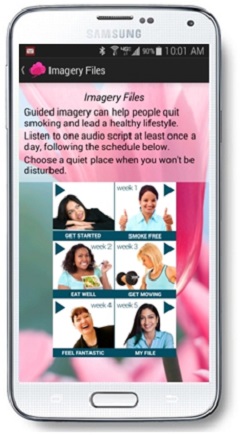Lung Cancer is the leading cause of cancer death in American women. But for many women who smoke, that well-documented fact is not enough of an incentive to quit.
They know that when they quit, they are likely to gain a lot of weight. And while they would like to quit, they don’t want to risk the extra pounds that follow.
And it’s not just their perception. Many studies have shown the majority of women who quit smoking gain eight to 10 pounds, on average. And women who quit, then return to smoking, often blame their weight gain for their relapse.
Judith S. Gordon, PhD, a behavioral psychologist and expert on smoking cessation at the University of Arizona, was interested in new ways to help women overcome this barrier to quitting. She was aware of studies that showed guided imagery can help people adopt healthy behaviors.
She assembled a multi-disciplinary team of researchers who developed the "See Me Smoke-Free" Android app – the first multi-behavioral mobile health app designed to help women quit smoking, eat well and be physically active.
The app was launched on the Google Play Store in March 2015. It uses guided imagery to help women quit smoking, while encouraging healthy eating and exercise habits to ward off weight gain and improve overall health. The app contains four guided imagery audio files -- “Be Smoke-Free,” “Eat Well,” “Get Moving,” and “Feel Fantastic” -- that women listen to consecutively for four weeks.
The home screen displays a number of measures, including the amount of time since the user last smoked a cigarette, the average number of daily cravings by week, and money saved by not purchasing tobacco products.
The app also provides direct connection to tobacco quitlines, and links to other local resources, including farmer’s markets, and nearby, low-cost gyms. See Me Smoke-Free also delivers motivational messages and tips for success, and provides awards for meeting goals.
Following See Me Smoke-Free’s launch, the team publicized the app in an effort to recruit participants for a pilot study of its potential. They planned to recruit 50 participants but enrolled 151. Their attrition rate was 52 percent.
“We used a novel recruitment method – ‘earned (free) media’ resulting from our press release, and social media,” said Dr. Gordon, who is a professor in the Community and Systems Health Science Division; Executive Director of Research Initiatives at the UA College of Nursing; and professor in the Department of Family and Community Medicine at the UA College of Medicine – Tucson.
“So, given that we used no paid advertising, we thought that recruiting 151 women, in the time we anticipated it would take to recruit only 50, indicated a high level of interest among our target population.
“Our attrition rate was high, but similar to many other eHealth and mHealth studies. We attribute this to the impersonal nature of the procedures we used for the study. Everything was done through the app or online with no personal contact.”
The results of the study were promising. Women who used the app reported significant increases in cessation. Specifically, self-reported seven-day abstinence was 37 percent at 30 days, and 47 percent at 90 days compared to 4 percent at baseline. And the more a woman used the app, the more likely she was to quit. There were also significant decreases in the number of cigarettes smoked among those women who didn’t quit.
Use of the app was also associated with significant increases in physical activity and healthy eating. Importantly, among women who quit, the average weight gain was only three pounds.
Based on these results, Dr. Gordon and her colleagues hope to test the efficacy of the See Me Smoke-Free app in a future randomized clinical trial.
“We wanted women to recognize that they are strong, they are beautiful, they are powerful, that they’re in control of their lives, and that they can use the app to engage in a healthier lifestyle,” Dr. Gordon said.
“And that includes being smoke-free.”
Dr. Gordon’s co-investigators on this project included medical anthropologist Julie Armin, PhD, and epidemiologist James K. Cunningham, PhD, in the Department of Family and Community Medicine; Melanie D. Hingle, PhD, MPH, RDN, with the Department of Nutritional Sciences in the UA College of Agriculture and Life Sciences; Thienne Johnson, PhD, with the Departments of Computer Science and Computer and Electrical Engineering at the UA; and Peter Giacobbi, Jr., PhD, with the College of Physical Activity and Sports Sciences at the University of West Virginia.
Gordon J.S., Armin J.A., Cunningham J.K., Giacobbi P., Hingle M., Johnson T., Abbate K., Howe C.L., & Roe D.J. (2017). Development and Evaluation of the See Me Smoke-Free Multi-Behavioral mHealth App for Women Smokers. Translational Behavioral Medicine. DOI: 10.1007/s13142-017-0463-7.

